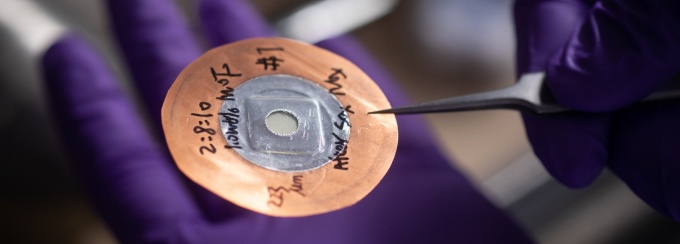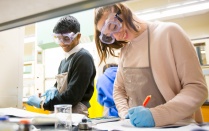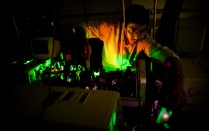Combined BS Chemistry/MS Materials Design and Innovation

The nine-semester combined Chemistry BS/Materials Design and Innovation MS is a program that provides qualified students pursuing a BS in Chemistry to seamlessly transition into the MS degree in Materials Design and Innovation more quickly and less expensively than through normal means. Students are admitted to the combined degree program between their fourth and sixth semesters, and must have a 3.0 average for all undergraduate courses up to the time of admission.
Learning Outcomes
Upon successful completion of all requirements, the student will have met learning outcomes of both programs, which are:
- Demonstrate acquisition of a broad set of chemical knowledge concerning the fundamentals in the four basic areas of the discipline (organic, inorganic, analytical, and physical chemistry).
- Solve problems competently by identifying the essential parts of a problem and formulating a strategy for solving the problem. They will be able to rationally estimate the solution to a problem, apply appropriate techniques to arrive at a solution, test the correctness of the solution, and interpret their results.
- Understand the objective of their chemical experiments, properly carry out the experiments, and appropriately record and analyze the results.
- Use standard laboratory equipment, modern instrumentation, and classical techniques to carry out experiments.
- Know and follow the proper procedures and regulations for safe handling and use of chemicals.
- Communicate the concepts and results of their laboratory experiments through effective writing skills.
- Successfully pursue their career objectives in advanced education in professional and/or graduate schools, in a scientific career in government or industry, in a teaching career in the school systems, or in a related career following graduation.
- Be able to use modern literature retrieval methods to obtain information about chemicals and chemistry topics.
- Have a basic understanding of biological chemistry.
- Have advanced laboratory skills in organic and inorganic synthesis and characterizational methods.
- Have advanced knowledge of analytical chemistry.
- Demonstrate professional competence, broadly defined, by assuming a role of increasing importance within an organization or business, or making progress towards an advanced degree.
- Apply scientific and engineering principles to solve technical problems, using a wide range of skills including experimental and informatics techniques.
- Be able to express oneself in writing and orally.
- Interact well with a broad range of people, especially on teams. Relate well with superiors, peers, and subordinates.
Questions?
Email mashour@buffalo.edu or contact Prof. Troy Wood, director of undergraduate studies, for more information on this program.

